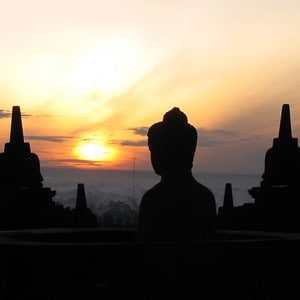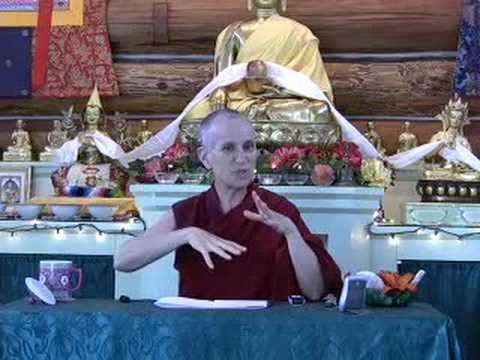Verse 14-2: What samsara is
Verse 14-2: What samsara is
Part of a series of talks on the 41 Prayers to Cultivate Bodhicitta from the Avatamsaka Sutra (the Flower Ornament Sutra).
- Prison of samsara
- Suicide does not work
- 12 links of cyclic existence
41 Prayers to cultivate bodhicitta: Verse 14-2 (download)
We’re on number 14, we did it yesterday briefly, I want to go into it a little more depth:
“May all beings escape from the prison of cyclic existence.”
This is the prayer of the bodhisattva when going outside.
The prison of cyclic existence, that is taking rebirth uncontrollably under the influence of afflictions and karma. That’s our very situation and these five aggregates are considered the prison of samsara. Don’t think it’s this world. We tend to think, this world—there’s war, there’s poverty, and there’s sickness, and there’s quarreling, and I just want to go somewhere else. Take my body, take my mind, I don’t change at all but I want to go to heaven or pure land or something else, where everything around me is really nice.
In other words, I get everything I want when I want it, and we think that that’s nirvana. Because this world around us where all these difficult people, politics—we think that’s samsara. That’s wrong. It’s not about we don’t change a bit but we just go live somewhere else where it’s perfect and our ego gets everything it wants. That’s really not it.
The problem—the samsara we’re in, the prison of cyclic existence—is this very body and mind. Then you might think, “Well, if I just kill myself, I’ll get rid of this body and mind.” Well, no, that doesn’t work either because you just get reborn under the influence of afflictions and karma. When you really get this, then you realize, suicide is a dead end, it doesn’t work, it just gets you more of the above, and probably a worse state.
Then what you’re left with is, if this body and mind is samsara, then the only thing to do is to look at what brings about this body and mind and then eliminate those causes. Eliminate the causes to take the body that gets old and sick and dies and our mind that’s so bananas. That’s the only way we’re going to get out of this mess. So when we trace backwards, what causes it, that’s where we come to afflictions and karma.
How do we get to afflictions and karma? That’s through the 12 links. Remember if you say aging and death, that’s the end of the life; what caused that, birth; what caused that, existence; what caused that, grasping; what caused that, craving; and you trace it back to the beginning of the 12 links. The first two links, first link is ignorance and the second link is conditioning factors which includes the afflictions and the karma. So that’s where it all starts.
If we don’t want birth which brings aging and death, then we’ve got to eliminate the first two links the ignorance and then the afflictions and karma. There’s no other choice besides that.
It’s really about doing some very, very fundamental change within us. It’s not like I was saying—there’s this idea of this fixed “I” and “me” that’s the controller and my emotions, and my needs, and my feelings, and my wants, and my preferences, and now liberation is all of those things get met. All my emotional needs are met, everybody loves me, I get recognized for everything I do. NO! That’s not nirvana.
Nirvana is cutting away the grasping and needing those things. Because not getting those things isn’t the problem. Feeling you need them, that’s the problem. So stuffing down those needs and saying, “No, no, I don’t need it.” That doesn’t work either because we’re just stuffing it. We’re not clearly seeing with wisdom that all that stuff is a bunch of hooey. That’s what we really need to do, is to develop our wisdom and see that stuff as hooey. To boot, it doesn’t inherently exist and in that way cutting the root of samsara and bringing about this very fundamental change in not taking a body that gets old and sick and dies to start with. And in not taking mental aggregates that are afflictions and karma and under their influence. That’s what liberation is, it’s a very fundamental change.
Don’t think that everything is going to remain the same, except that you’re going to get what you want. It is really very fundamental. So, let’s go for it. Nothing else to do. What else are you going to do? Go for liberation. Let’s do that.
Venerable Thubten Chodron
Venerable Chodron emphasizes the practical application of Buddha’s teachings in our daily lives and is especially skilled at explaining them in ways easily understood and practiced by Westerners. She is well known for her warm, humorous, and lucid teachings. She was ordained as a Buddhist nun in 1977 by Kyabje Ling Rinpoche in Dharamsala, India, and in 1986 she received bhikshuni (full) ordination in Taiwan. Read her full bio.


